Check Your Privacy Settings — Strangers Can Find Personal Info on Your Facebook
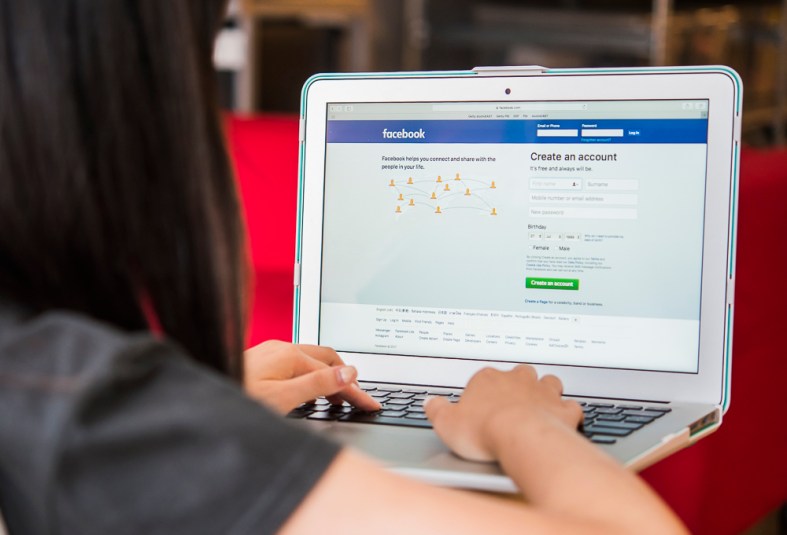
Having a Facebook can be a fun way to keep in touch with family and friends, but if you’re not careful with your privacy settings, you can be accidentally revealing way more information about yourself than you realize. We’re not just talking about strangers being able to see your profile pictures or what friends you have in common — we’re talking about finding actual personal information. So what kind of details can people find out on Facebook if you’re not careful?
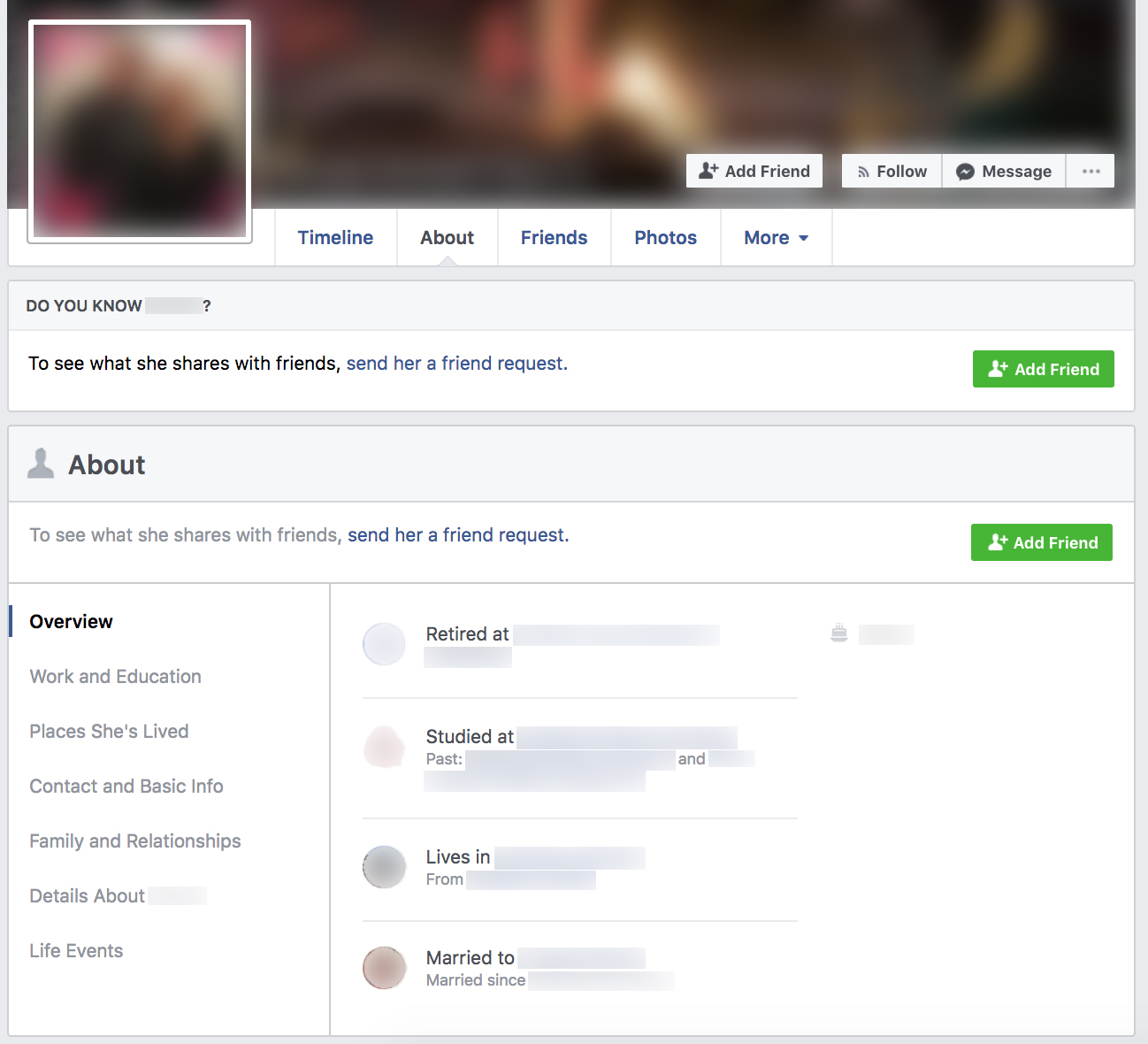
Your Birthday on Facebook
If someone goes to your profile and then clicks the “About” tab, chances are they have easy access right away to your birthday. You may or may not have your birth year displayed, but most people have at least their birth month and day visible to the public. Even if you don’t allow Facebook users who aren’t our friends to see your birthday, they may be able to find it if they can view your wall posts. A simple scroll down through the posts on someone’s Facebook wall can reveal what day someone’s friends posted birthday messages. They might even be able to figure out your full birthdate if someone has posted what age you turned.
Where You Went to School
Again, this is often publicly available information listed on people’s profiles. Like birthdays, you can find it in the About section. Facebook gives you the option to list which colleges or universities you went to, how long you attended them, and even what you studied. You may have even been prompted to enter your high school’s name and graduation dates as well. If you haven’t carefully checked your privacy settings, this might be information that anyone can find.
Your Phone Number and Email
Everyone has an email registered for their Facebook account — you need one to log in. But if you haven’t set this information to private, someone could find it on your page.
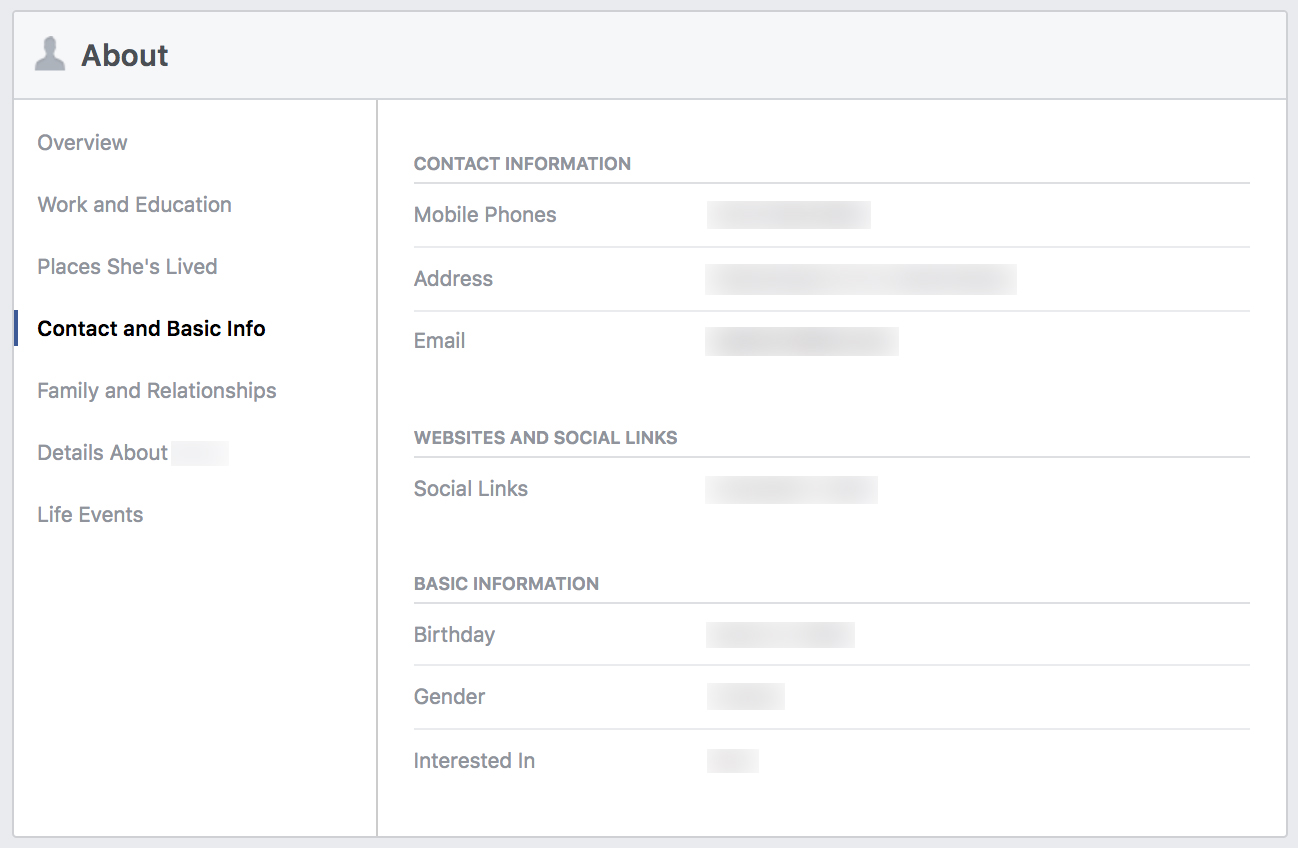
You may have also voluntarily included your phone number if you were looking to find contacts on Facebook or given your contacts an opportunity to find you. Even if it’s not displayed, someone may be able to search for your phone number and, if it’s in your profile information, find your page.
Your Major Life Events
If you’ve ever created a “Life Event” on Facebook, they might be publicly viewable. Life events on Facebook can include changes in your work or education, family and relationships, moving or buying a home, health updates, and travel plans. Sometimes you don’t even have to specifically create a life update. If you mark yourself as “in a relationship” with someone, and then mark yourself as “single” later on, that relationship can be added automatically to a timeline of your life events accessible on your About page.
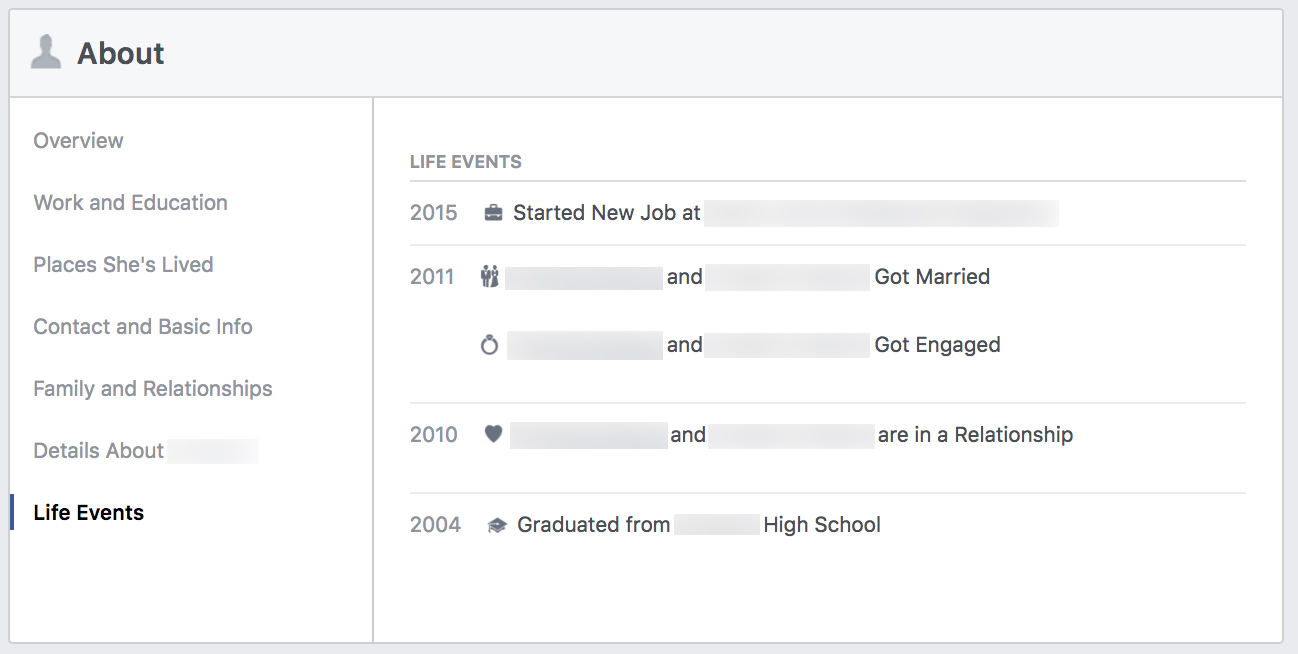
Your Family Members
If you have someone listed as family on your Facebook, that information can, once again, be found on your About page. You may have even listed what relationship you have with each person. That means that someone viewing your page might be able to find out who your siblings are, who your cousins are, or who your children are if you’re friends with them. They also might be able to find this information by looking through your posts and photos. If you shared a family holiday photo and captioned it, “My husband, James, and lovely daughters, Erica and Andrea,” they now know what your family looks like and what their names are.
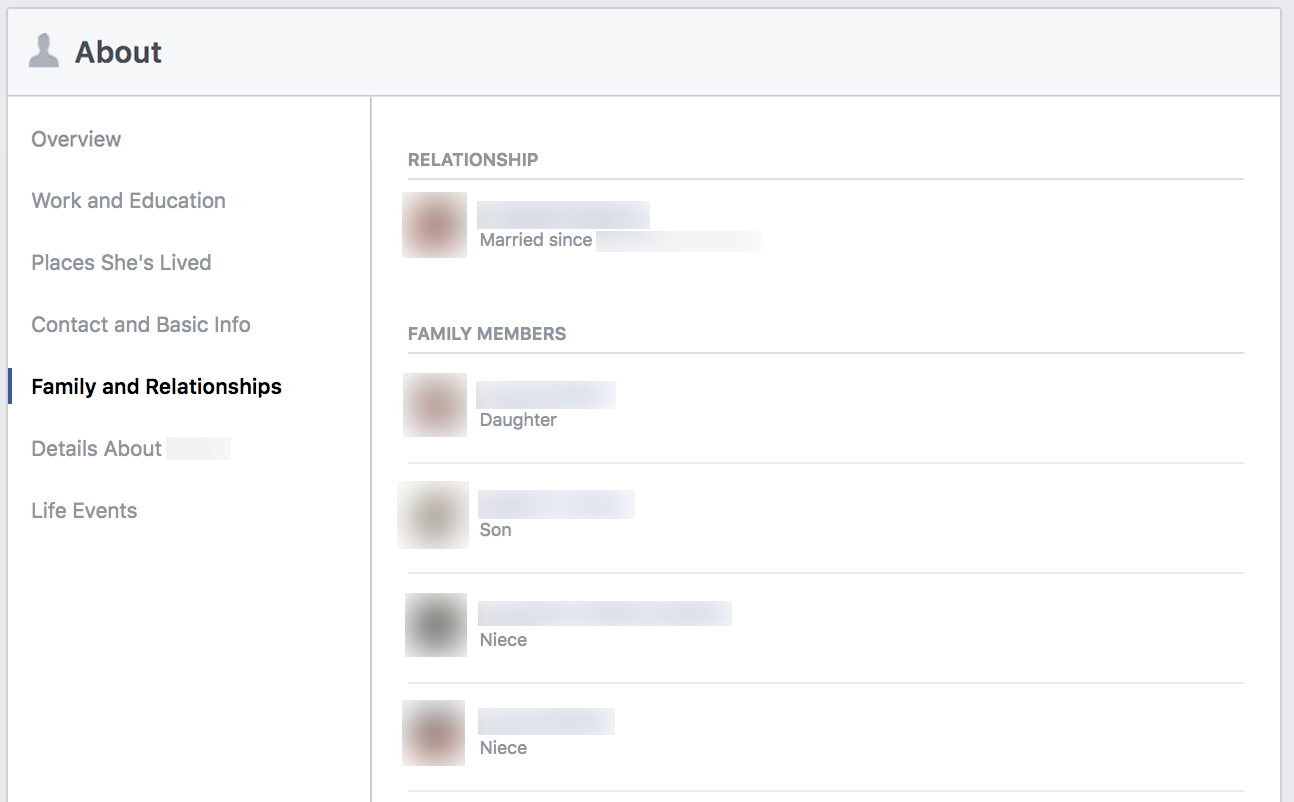
Your Friends From School or Hometowns
When looking at your friend list, strangers are almost always able to see the friends that they have in common with you. But if your privacy settings aren’t very private, they might be able to get a lot more information than that. They may be able to look through your whole list of friends — and could, for example, search through your friends for anyone with the same last name as you. Similarly, Facebook gives them the option to look at people on your friend list who live in your “Current City,” “Hometown,” “College,” or “High School.”
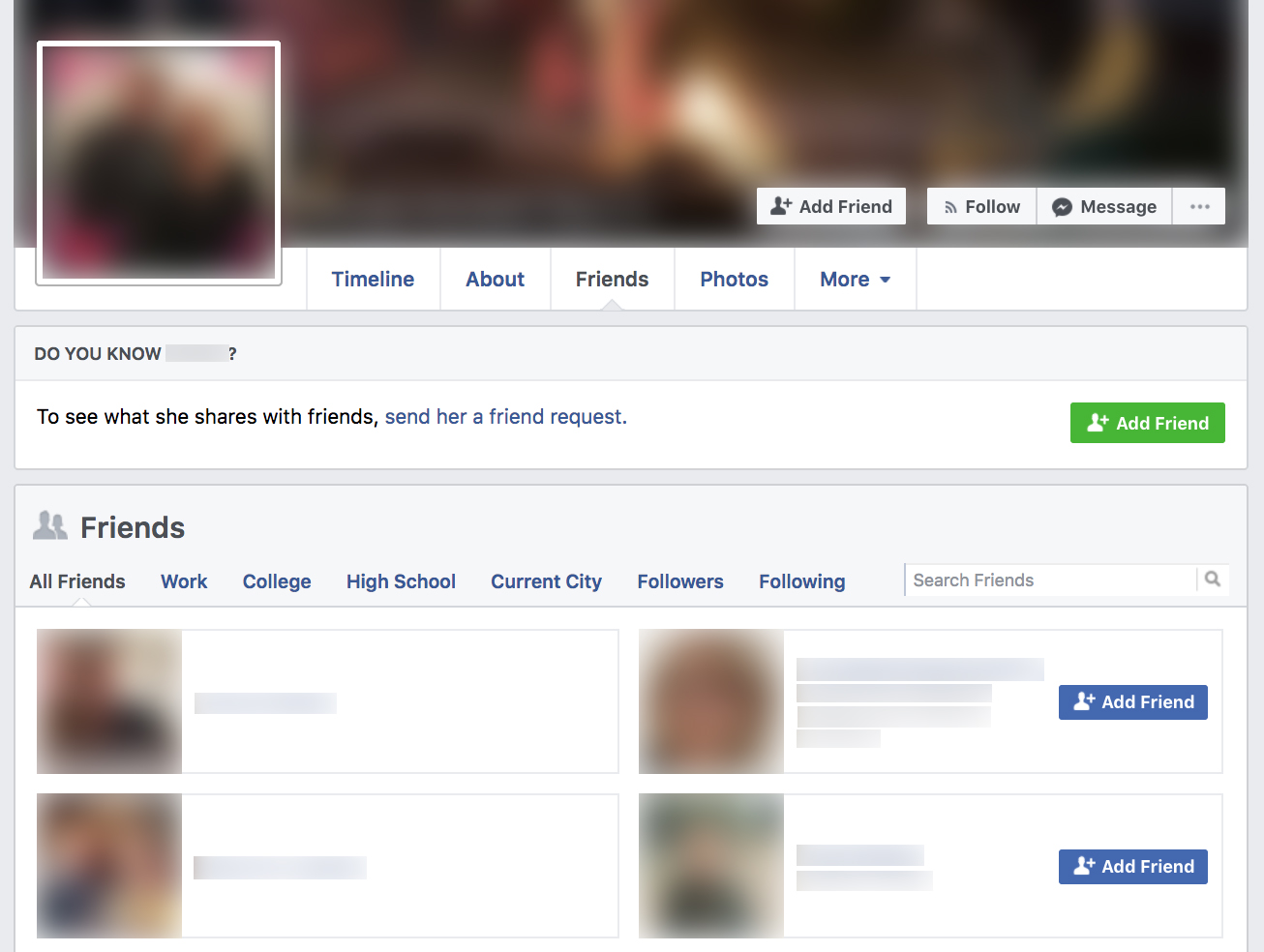
Where You’ve Been
If you’re someone who likes to “check in” to locations on Facebook, you also need to be careful about who those posts can be seen by. When viewing someone’s profile, there’s a dropdown menu that says “More” next to “About,” “Friends,” and “Photos.” From there, people can click to see where you’ve checked in, which can give them plenty of information about where you like to spend your time. Whether you’re checking in at the gym, the library, or your favorite restaurant, you can be unintentionally cluing people into what your regular schedule looks like.
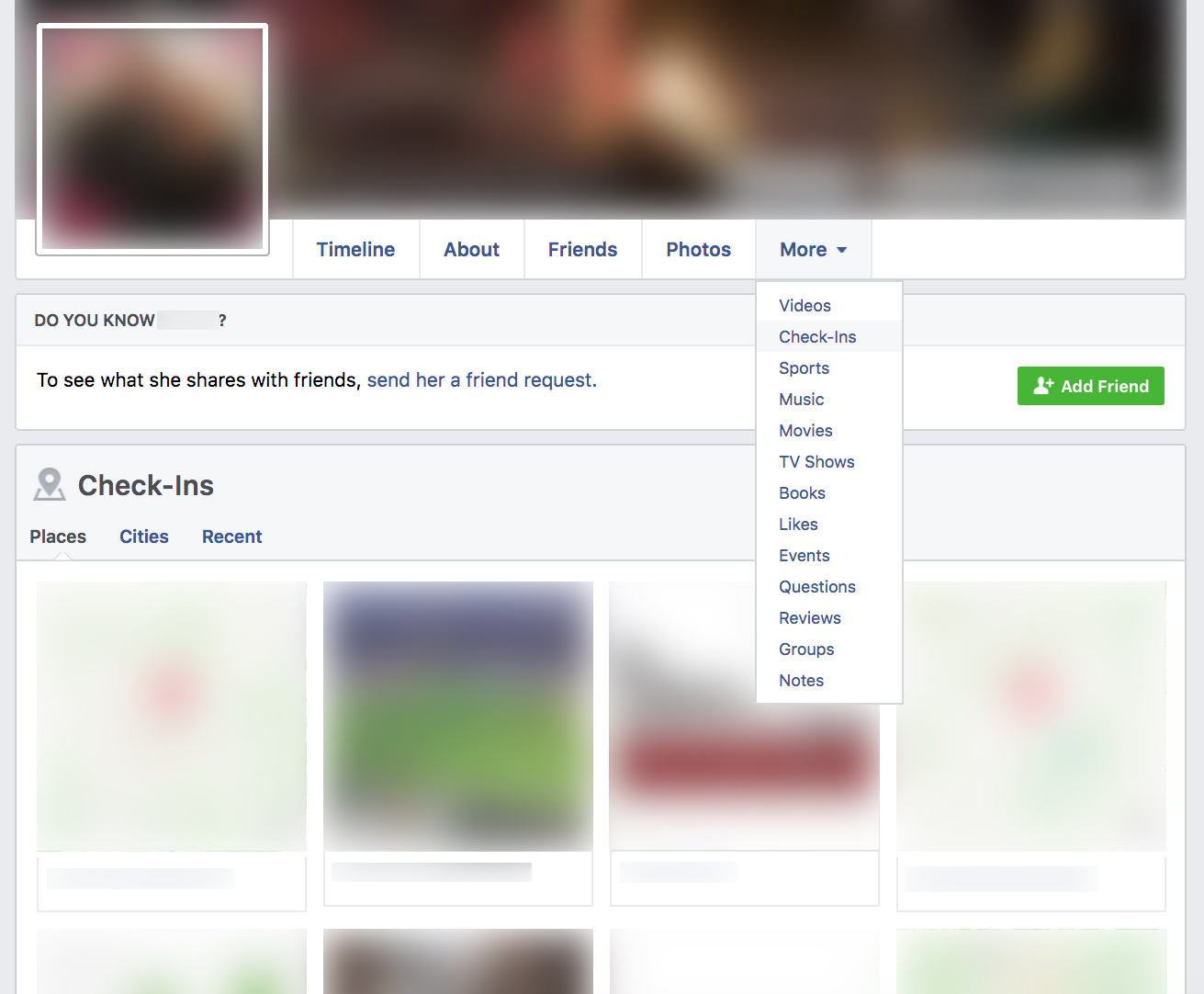
Plenty of Other Personal Details
Other options on the More dropdown menu include Groups, Likes, and Events. Depending what kind of pages that you’ve “liked” on Facebook, people might be able to find out even more identifying or personal information. The same goes for events that you’ve attended. For example, if you’ve attended an event titled “Jackson High Class of 2005 Reunion,” someone may be able to glean your high school and graduation year. If you’ve liked a page called “Kappa Kappa Game at the University of Alabama,” they may be able to figure out where you went to college and what sorority you were a part of. If you’re a member of a group titled “You know you grew up at the Jersey Shore if…,” people may be able to see where you spent your summers when you were younger.
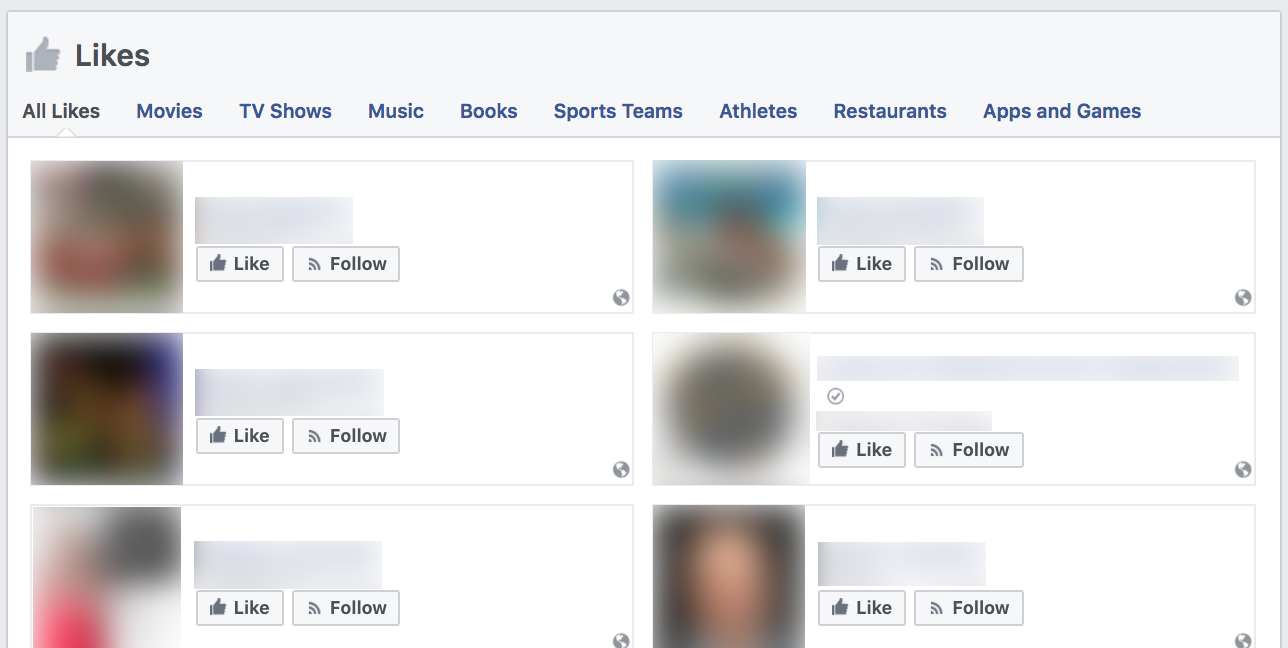
Does this Matter?
It only matters to whatever degree you consider your personal information to be private. If you’re not concerned about sharing your birthday or wedding anniversary date, this is likely not something to worry about. But if you’re concerned about what you’ve made public, you might want to look into your privacy settings. Based only through a quick perusal through a stranger’s Facebook page, I was able to quickly find photos of their daughters, what elementary school their children went to, who their pet care provider is, what high school they went to, where they work, where they live, and where they’re from originally — and this is someone whose profile is relatively private.
Wondering how to change your Facebook privacy settings?
On Facebook, there’s an arrow in the top right corner of the website that you can click to access your privacy settings. From there, click “Settings” from the dropdown menu.
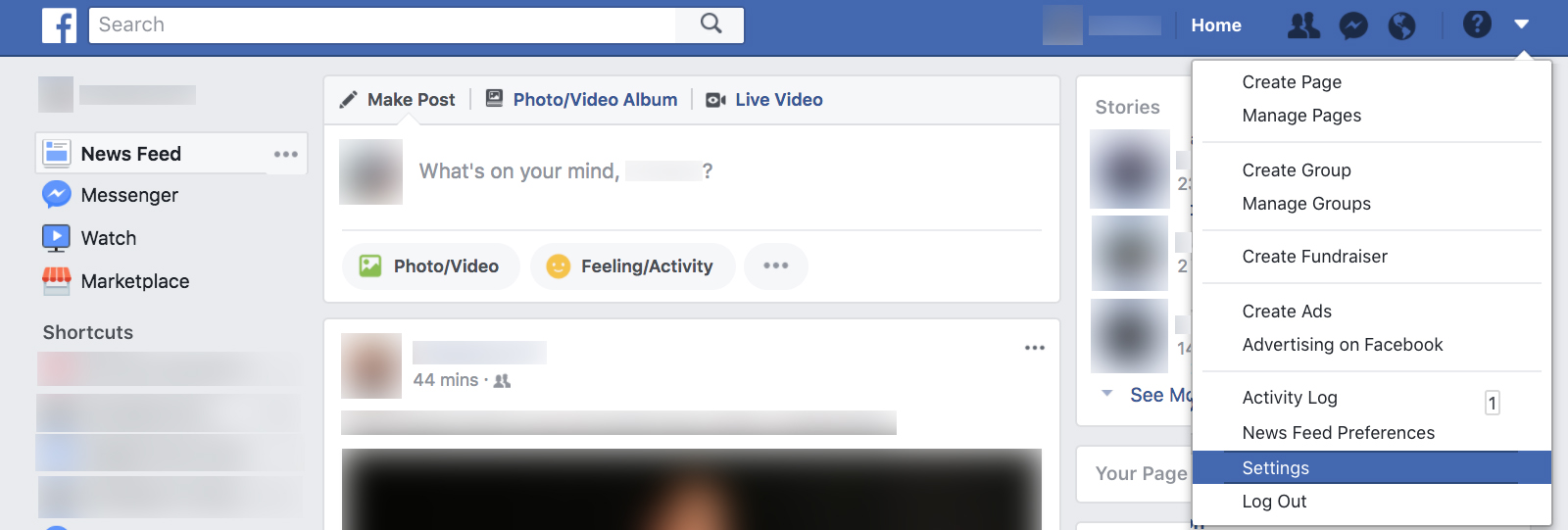
Then, click “Privacy” on the left hand navigation. From there, you can change who can send you friend requests, see your friends list, search your email, and look up your phone number. You can also choose whether or not to have your profile indexed through search engines — meaning you can control whether or not it’ll pop up when someone searches your name on Google.
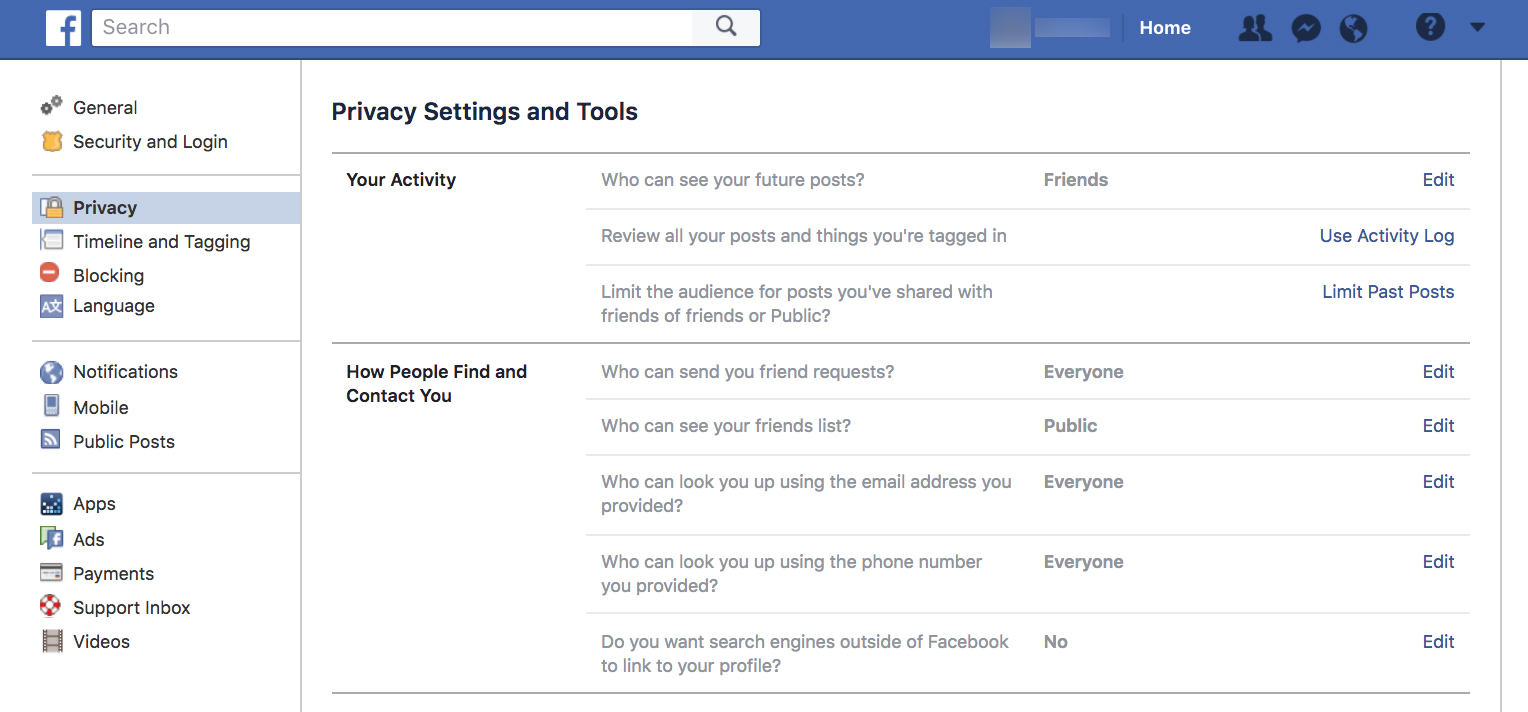
Additionally, you can change who can see your future posts. If you want to change who has access to your past posts, you can do that too. You can also use the activity log to view posts, photos, and comments you’ve been tagged in by others. If you go to “Public Posts” on the left-hand menu, you can get even more specific. Even if you have your posts, or just certain posts, set to public, you can control whether the comments on them are open to the public. Depending on your settings, someone may be able to see your profile picture, but not be able to leave a comment.
Worried about specific people? If you go to “Blocking” on the left-hand navigation, you can block individuals on Facebook. You can also block someone from sending you messages if you want to be friends with them without them messaging you privately. You can block pages from viewing your profile or interacting with comments you’ve written.
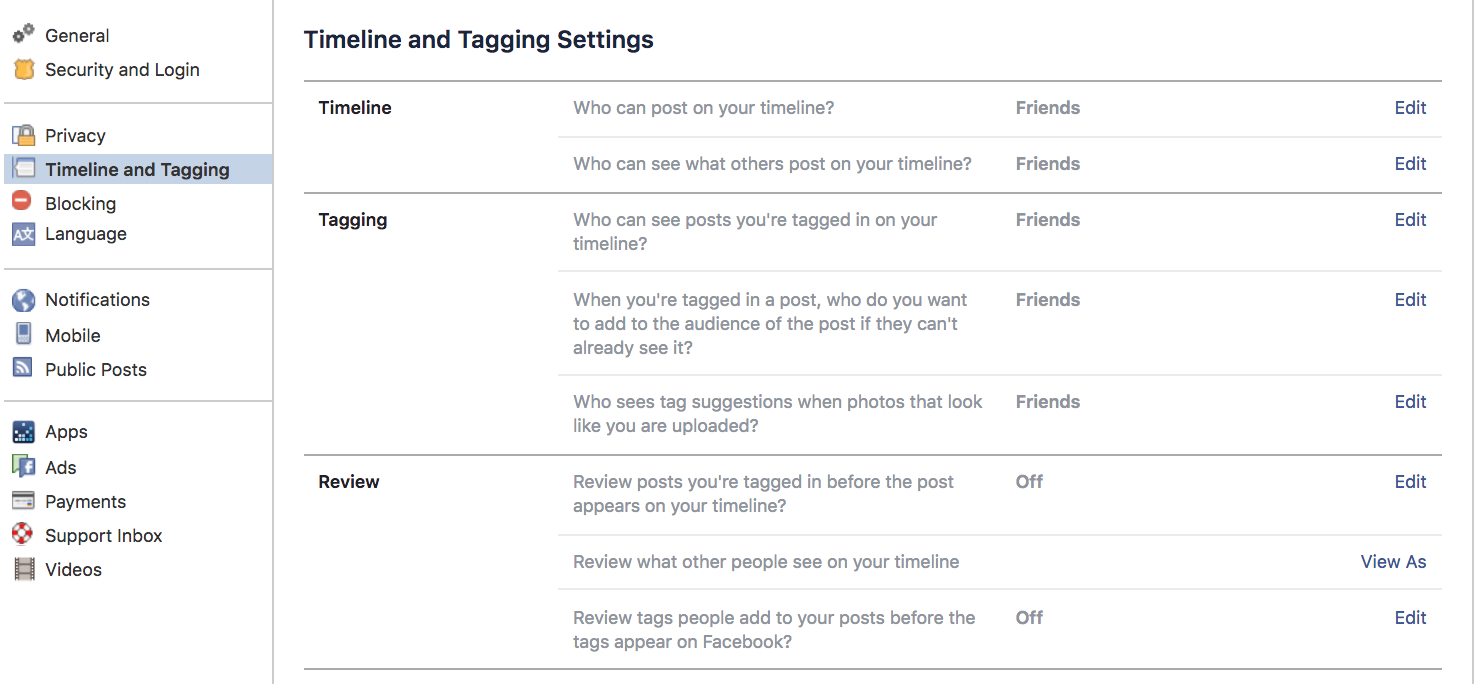
Go to “Timeline and Tagging” and you can control who can write a message on your page, as well as who those messages are accessible to. You can adjust not only what posts and pictures people tag you in, but who can see those tagged posts on your profile. On this same Settings page, there’s also an option to “review” your profile through the perspective of someone else’s page. By clicking “view as,” you can see what your page looks like to a specific person or to the public. This can be helpful to see how strangers are viewing your page — or to make sure that certain posts are not visible to your children, like any embarrassing old photos someone uploaded.
There are some things you can’t change.
Privacy settings are managed on an individual basis by each group. A group can be set up as public (meaning anyone can see that the group exists, who is a member of it, and what people post in it), closed (meaning people can see the group and its members, but not the posts), or secret (meaning you have to be invited to a group to see that it exists and look through its posts and members). If you’re a member of public groups, this information will be available on your profile — so if you don’t want someone to find out the groups you’re a member of and how that reflects on your personal details, be wary of the groups that you join. But at the end of the day, don’t worry about it all too much. After all, there aren’t many people out there that are going to care what school you went to back in 1997 — and if they do care, chances are its because they went to that school, too.
More from FIRST
New Facebook Messenger Scam Has Experts Concerned













